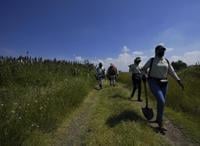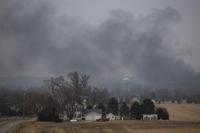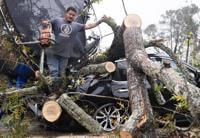MEXICO CITY (AP) — Another mother searching for her disappeared child has been killed in Mexico, the fifth murder of a volunteer search activist in Mexico since the start of 2021.
Members of her search group called Tuesday for justice in the killing of Maria Vázquez Ramírez, which they called “cowardly.”
Prosecutors in the violence-wracked state of Guanajuato said Vázquez Ramírez was shot to death Sunday in the city of Abasolo. She had been searching for her son Osmar, who disappeared in Abasolo in June.
The motive in the killing remained unclear; most searchers say they are looking for the bodies of their children, not evidence to convict their killers.
There are over 100,000 missing people in Mexico, and police often lack the time, expertise or interest to look for the clandestine grave sites where gangs frequently bury them.
Much of that effort has been left to volunteer search teams known as “colectivos” made up of mothers of the missing, who often call themselves as “Searching Mothers.”
Vázquez Ramírez's group posted a tribute to her Monday, showing a photo of her with her missing son and the words, “I didn't live long enough to find you.”
It was the second such killing in a month.
In October, attackers in the central city of Puebla shot to death Esmeralda Gallardo, who led efforts to find her missing 22-year-old daughter.
Guanajuato security analyst David Saucedo said “the searchers are being killed by drug cartels.”
Two cartels — Santa Rosa de Lima and the Jalisco cartel — have carried out a years-long turf war for control of Guanajuato state. They kill off rivals, kidnapping victims and innocent people and hide their bodies in mass graves or body dumping grounds.
“The cartels ... are burying the bodies in narco pits so they won't be found, so they won't be charged with kidnapping or murder,” Saucedo said. “If there is no body, there is no crime.”
“But the work of the search groups has been finding bodies, and that puts the narcos at risk,” Saucedo said.
The volunteer umbrella group Movement for Our Disappeared in Mexico decried the fact that searchers often lack adequate protection.
“It is the government's responsibility to guarantee the security of searching relatives, and it is also the government's responsibility to search for all the missing people,” the group said. “Violence against searchers should not become the norm.”
Faced with official inaction or incompetence, many mothers are forced to do their own investigations or join search teams that, often acting on tips, cross gullies and fields, sinking iron rods into the ground to detect the telltale stench of decomposing bodies.
The searchers, and the police who sometimes accompany them, usually focus on finding graves and identifying remains. Search groups sometimes even get anonymous tips about where bodies are buried, knowledge probably available only to the killers or their accomplices.
But in one case in Guanajuato, the location of a clandestine burial site was reportedly given away by a stray dog the dug up part of a human leg and was seen running off with it.








































